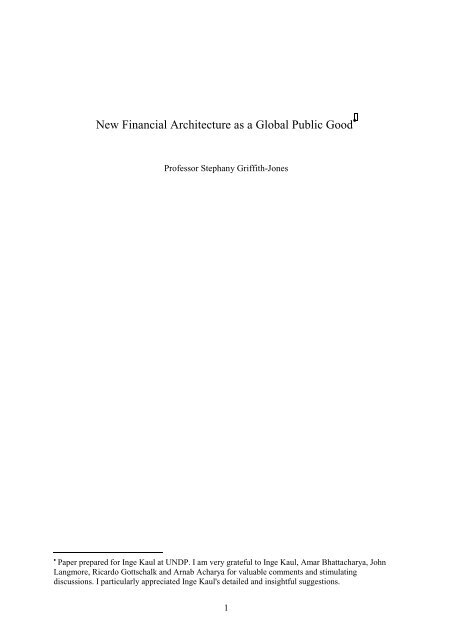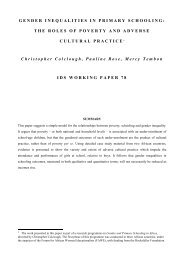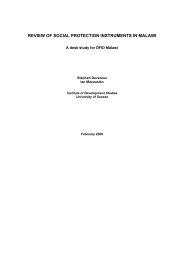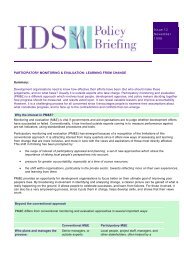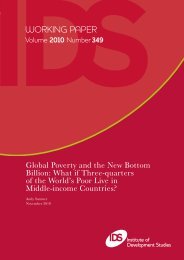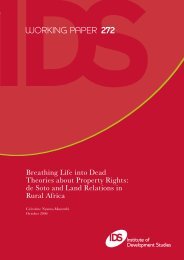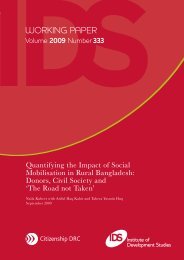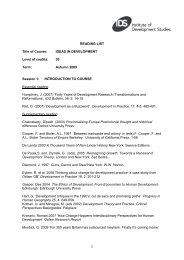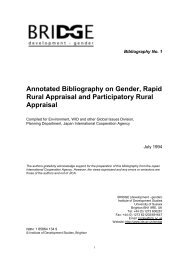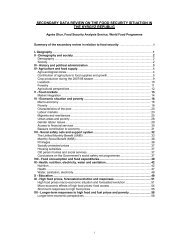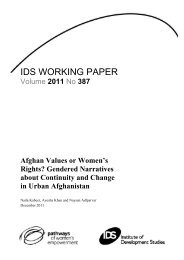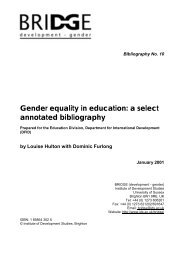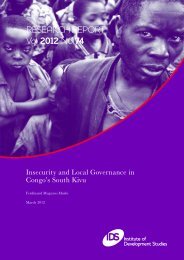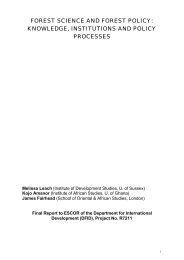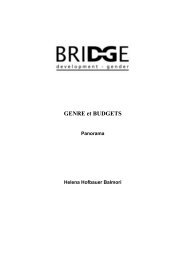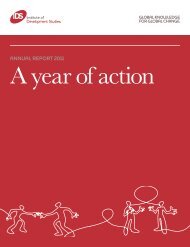New Financial Architecture as a Global Public Good - Institute of ...
New Financial Architecture as a Global Public Good - Institute of ...
New Financial Architecture as a Global Public Good - Institute of ...
Create successful ePaper yourself
Turn your PDF publications into a flip-book with our unique Google optimized e-Paper software.
<strong>New</strong> <strong>Financial</strong> <strong>Architecture</strong> <strong>as</strong> a <strong>Global</strong> <strong>Public</strong> <strong>Good</strong> •<br />
Pr<strong>of</strong>essor Stephany Griffith-Jones<br />
• Paper prepared for Inge Kaul at UNDP. I am very grateful to Inge Kaul, Amar Bhattacharya, John<br />
Langmore, Ricardo Gottschalk and Arnab Acharya for valuable comments and stimulating<br />
discussions. I particularly appreciated Inge Kaul's detailed and insightful suggestions.<br />
1
Table <strong>of</strong> Contents<br />
I Introduction 3<br />
II Required new architecture and progress so far 5<br />
A. A new global and regional architecture required to achieve<br />
financial stability<br />
B. What progress on international financial reform<br />
III The politics <strong>of</strong> the international reform process 10<br />
A. The broad context<br />
B. The actors in the reform process and their objectives<br />
IV Suggestions for me<strong>as</strong>ures to accelerate and deepen 18<br />
international financial reform<br />
Annex 1 Proposal for incre<strong>as</strong>ing developing country participation in 23<br />
global financial governance<br />
Bibliography 27<br />
2
I<br />
Introduction<br />
International financial stability and efficiency is a very important global public good,<br />
especially significant for poor people in developing and emerging countries. <strong>Financial</strong><br />
stability and efficiency can make an important contribution to development; lack <strong>of</strong><br />
financial stability - both nationally and internationally - can be an important obstacle<br />
to growth, development and poverty reduction. As Wyploscz (1999) points out,<br />
financial instability is a global public bad because it spreads across countries;<br />
collective public international action is required to overcome it. As we will argue in<br />
this paper, there is at present an under provisioning <strong>of</strong> the international public good <strong>of</strong><br />
financial stability, which is particularly - but clearly not only - damaging for<br />
developing countries. Poor people in developing countries are particularly unfairly and<br />
badly hit by financial and currency crises, for three main re<strong>as</strong>ons: a) they are unfairly<br />
hit, because they are normally innocent bystanders, who suffer effects <strong>of</strong> crises, which<br />
they played no role in causing. b) they are particularly badly hit because they <strong>of</strong>ten<br />
bear a disproportionate burden <strong>of</strong> the cost <strong>of</strong> crises, and c) l<strong>as</strong>t, but certainly not le<strong>as</strong>t,<br />
the welfare costs for the poor are much higher because their income losses imply falls<br />
from incomes which are already very low; indeed they may mean - <strong>as</strong> in Indonesia in<br />
1998 - that many people fall below the poverty line. <strong>Financial</strong> efficiency can also<br />
make an important contribution to development; however, it is important that financial<br />
efficiency is not defined only in its' own terms (e.g. via growth <strong>of</strong> financial <strong>as</strong>sets or<br />
reduction <strong>of</strong> financial inter-mediation costs), even though these variables may play a<br />
positive role, but that the key criterion for me<strong>as</strong>uring financial efficiency is its'<br />
contribution to growth and development; in that context, me<strong>as</strong>ures to develop financial<br />
institutions and deepen markets, can play an important role.<br />
It should however, be stressed that providing the global public good <strong>of</strong> financial<br />
stability and efficiency is not just in the interest <strong>of</strong> developing countries and the poor.<br />
Quite the contrary! Stable growth in developing countries provides growing markets<br />
for developed country exporters and incre<strong>as</strong>ing pr<strong>of</strong>itable opportunities for developed<br />
country investors. Greater prosperity in these countries also reduces potential political<br />
instability there and greater pressure for migration to developed economies, both <strong>of</strong><br />
which could have negative effects for the latter.<br />
More broadly, avoidance <strong>of</strong> currency crises in developing and transition economies<br />
significantly reduces the risk <strong>of</strong> them spilling over to developed economies, and thus<br />
to the global economy; this risk materialised briefly during September 1998, when in<br />
the aftermath <strong>of</strong> the Russian crisis, and LTCM, US credit markets very briefly dried<br />
up. Thus, crises prevention and better crises management for emerging markets is an<br />
important way to better safeguard global financial stability, which is clearly an<br />
important global public good, <strong>as</strong> well <strong>as</strong> helping sustain growth in developing<br />
countries, the latter also having very positive externalities for the developed<br />
economies.<br />
In this sense, the perspective <strong>of</strong> developing countries, which we outline below - to<br />
meaningfully reform the international financial architecture, so it significantly<br />
improves both international financial stability and efficiency - is actually in the<br />
interests <strong>of</strong> the global economy. There is an interesting parallel with the situation that<br />
emerged at Bretton Woods, where Keynes - by defending the interests <strong>of</strong> debtor<br />
nations such <strong>as</strong> the UK - w<strong>as</strong> defending also the interests <strong>of</strong> a more prosperous and<br />
3
stable global economy. Similarly, if, international me<strong>as</strong>ures are taken to help<br />
safeguard financial stability and growth in developing countries, these me<strong>as</strong>ures will<br />
improve the global public goods <strong>of</strong> stability and prosperity.<br />
This global public good can be de-composed into two parts: a) the avoidance <strong>as</strong> well<br />
<strong>as</strong> better management <strong>of</strong> currency and financial crises, which <strong>as</strong> recent experience h<strong>as</strong><br />
shown are very costly for developing countries and for poor people; indeed, deep and<br />
frequent crises in developing countries could undermine achieving the UN target to<br />
halve poverty by 2015, and b) the provision <strong>of</strong> sufficient long-term and sufficient<br />
stable capital flows to different categories <strong>of</strong> developing countries (including lowincome<br />
ones), so these flows can complement domestic savings, <strong>as</strong> well <strong>as</strong> transfer<br />
technology and management know-how.<br />
Given the large number, frequency, severity and high development <strong>as</strong> well <strong>as</strong> financial<br />
cost <strong>of</strong> recent crises, much emph<strong>as</strong>is in recent writing h<strong>as</strong> been on combating the<br />
global public bad <strong>of</strong> financial instability. Wyploscz (1999) and others have clearly<br />
argued that financial instability is a potential public bad that spreads across countries<br />
through negative externalities and that collective action problems have led so far to an<br />
under provision <strong>of</strong> the internaional public good <strong>of</strong> financial stability. Instability<br />
originates nationally to a certain extent; that is why the provision <strong>of</strong> the public good <strong>of</strong><br />
financial stability h<strong>as</strong> to start at the national level. However, this is not enough, due to<br />
international spillovers, market failures that are particularly large at the international<br />
level and races to the bottom (see, again, Wyplosz, op.cit for an excellent analysis).<br />
There is a growing literature that shows the strong negative link between financial<br />
instability and macro-economic volatility on the one hand and growth, investment and<br />
poverty reduction on the other hand. 1 The need to overcome the negative impact <strong>of</strong><br />
this global public bad <strong>of</strong> financial instability h<strong>as</strong> led since 1998 to an active debate -<br />
and some, though very limited action - on international financial reform (see Griffith-<br />
Jones 1999). Less emph<strong>as</strong>is, and even less action, h<strong>as</strong> been placed on the second t<strong>as</strong>k<br />
described above, that is the provision <strong>of</strong> sufficient long term capital flows (both<br />
private and public), to different categories <strong>of</strong> developing countries, and especially the<br />
poorest. (For a review <strong>of</strong> these latter issues, see for example Griffith-Jones, Ocampo<br />
with Cailloux, 1999).<br />
From the perspective both <strong>of</strong> developing countries, and <strong>of</strong> the global economy, it is<br />
crucial to: a) make concrete and significant progress in the implementation <strong>of</strong> a new<br />
international financial architecture; this new architecture (drawing on the extensive<br />
discussion which h<strong>as</strong> already taken place) would facilitate the provision <strong>of</strong> the global<br />
public good <strong>of</strong> global financial stability, which is deeply under-provided, and b)<br />
develop a conceptual framework, and implement mechanisms, to help attract sufficient<br />
long-term capital flows to both middle-income and low-income countries.<br />
To summarise, financial stability clearly h<strong>as</strong> the properties <strong>of</strong> a global public good.<br />
Under-provision <strong>of</strong> global financial stability h<strong>as</strong> high growth and development costs.<br />
There are different ways in which financial stability can be - and is being - achieved.<br />
Some ways generate a higher growth and/or a more equitable distribution <strong>of</strong> benefits<br />
than others. The present international financial architecture, and many <strong>of</strong> the recent<br />
1 See Reisen & Soto (2000), Angela Wood (2001), Hausmann (1996), Rodrick (1998)<br />
4
proposals, tend to benefit more large, private financial actors and, more broadly,<br />
developed economies than developing countries. This fact implies that adjustment<br />
burdens are unduly shifted to developing countries; such adjustment is <strong>of</strong>ten incredibly<br />
demanding - and sometimes almost impossible - given the volatile nature <strong>of</strong> today's<br />
financial markets. Therefore, it would be in the interests <strong>of</strong> all to put in place a<br />
financial architecture that better fits the needs and interests <strong>of</strong> all actors, is better<br />
implemented and therefore actually enhances the stability and efficiency <strong>of</strong> the present<br />
financial system. As a consequence, a fairer international architecture would also be a<br />
more efficient one.<br />
In what follows (section II) we will examine relatively briefly the mechanisms and<br />
institutions that would need to be in place to produce the global public good <strong>of</strong><br />
financial stability with special emph<strong>as</strong>is on the regional and global dimensions. We<br />
would then look at what progress h<strong>as</strong> been made so far. Then in section III, we will<br />
examine the political process involving the discussion <strong>of</strong> international financial<br />
reform. Special emph<strong>as</strong>is will be placed on outlining the key actors involved, their<br />
broad aims in this process <strong>as</strong> well <strong>as</strong> their more specific objectives, on concrete<br />
changes in the global financial architecture. A key point that will emerge is that while<br />
there is quite strong consensus on the broad aims <strong>of</strong> international financial reform,<br />
(which is positive and needs to be built on) there is far less agreement on specific key<br />
reform actions. Section IV will conclude with suggestions, especially but not only for<br />
developing countries, on actions that could help significantly accelerate, and deepen<br />
the process <strong>of</strong> international financial reform, in ways that could achieve the twin aims<br />
<strong>of</strong> stability and efficiency.<br />
II<br />
Required new architecture and progress so far<br />
A. A NEW GLOBAL AND REGIONAL ARCHITECTURE REQUIRED TO<br />
ACHIEVE FINANCIAL STABILITY<br />
Developed and developing countries both face a difficult challenge, which is to create<br />
a global financial system that supports - and does not undermine - growth and<br />
development in the dramatically changed context <strong>of</strong> the 21 st Century, characterised by<br />
large, but extremely volatile and highly concentrated private capital flows, <strong>as</strong> well <strong>as</strong><br />
relatively small international public financial institutions. There is not a totally clear<br />
cut blueprint for what such a international financial architecture should look like;<br />
however a clear vision <strong>of</strong> key elements in this architecture h<strong>as</strong> emerged both from the<br />
international discussion since 1998, and from parallels drawn from the institutional<br />
mechanisms developed nationally <strong>as</strong> domestic credit and capital markets grew.<br />
There is a need at the global level for four functions to be met: a) appropriate<br />
transparency and regulation <strong>of</strong> international financial loan and capital markets, b)<br />
provision <strong>of</strong> sufficient international <strong>of</strong>ficial liquidity in distress or crises conditions, c)<br />
accepted mechanisms for standstill and orderly debt work-outs, at the international<br />
level and d) appropriate mechanisms for development finance. The first mechanism<br />
would help prevent crises, which are developmentally, socially and financially very<br />
costly. The second and third mechanisms would help manage crises better to make<br />
them less costly, especially to poor people in developing countries.<br />
5
The fourth mechanism, linked to development finance, helps channel public flows to<br />
countries (especially low-income ones) that do not have sufficient access to private<br />
flows, to sectors where social returns are high, and higher than private returns such <strong>as</strong><br />
in activities with very high national externalities; it should help finance global public<br />
goods, such <strong>as</strong> dise<strong>as</strong>e prevention and environment protection; it should help catalyze<br />
private flows to countries and sectors where insufficient flows are going and finally it<br />
should - in times <strong>of</strong> crises - channel public flows in a counter-cyclical way, to help<br />
incre<strong>as</strong>e fiscal spending on social protection schemes, crucial to protect the poor in<br />
times <strong>of</strong> distress. Meeting all these functions adequately (some <strong>of</strong> them new ones)<br />
would require an incre<strong>as</strong>e in total multilateral lending.<br />
These institutional mechanisms at the global level need to be complemented at the<br />
regional level, for at le<strong>as</strong>t three re<strong>as</strong>ons (also see Ocampo, 2000). The first is growth<br />
<strong>of</strong> intra-regional trade and capital flows, which incre<strong>as</strong>es macroeconomic linkages; <strong>as</strong><br />
a result certain functions can be better carried out at le<strong>as</strong>t partly at a regional level,<br />
these can include surveillance and consultation <strong>of</strong> macroeconomic policies, <strong>as</strong> well <strong>as</strong><br />
mutual surveillance for national prudential regulation <strong>of</strong> the financial system. One<br />
advantage <strong>of</strong> regional surveillance is that <strong>as</strong>ymmetries <strong>of</strong> information are smaller at a<br />
regional level, due to regional knowledge. Secondly, contagion <strong>of</strong> crises <strong>of</strong>ten starts<br />
within regions; therefore a complement to global mechanisms, particularly for<br />
liquidity provision, can be provided by regional mechanisms which can provide a first<br />
line <strong>of</strong> defence; such a mechanism is currently beginning to be implemented within<br />
Northe<strong>as</strong>t Asia, and h<strong>as</strong> existed for several decades within the European Union.<br />
Thirdly, for smaller countries, the access to a broader alternative set <strong>of</strong> institutions for<br />
crisis management, including regional ones, may be particularly valuable <strong>as</strong> they have<br />
relatively less influence and bargaining power with global institutions. More generally,<br />
the creation and strengthening <strong>of</strong> regional developing country mechanisms and<br />
institutions will also help incre<strong>as</strong>e developing countries' ability to negotiate for a fuller<br />
global financial architecture.<br />
However significant regional arrangements may become, it is important to stress that<br />
they should be perceived <strong>as</strong> a complement and not a substitute for global institutions<br />
(such <strong>as</strong> the IMF, World Bank and the BIS). These are particularly important in a<br />
world where finance and markets are incre<strong>as</strong>ingly globalised.<br />
As our key concern here is global financial stability, we are stressing global and<br />
regional dimensions <strong>of</strong> the international financial architecture. Furthermore, <strong>as</strong><br />
developed further below, up to now most action h<strong>as</strong> taken place precisely in these<br />
national <strong>as</strong>pects (<strong>of</strong> recipient countries) and very limited progress h<strong>as</strong> been made on<br />
the truly international <strong>as</strong>pects <strong>of</strong> the required architecture. The latter dimension is<br />
crucial <strong>as</strong> to an important extent crises are caused by failures in private global<br />
financial markets, which need to be tackled at an international level. However,<br />
naturally these me<strong>as</strong>ures have to be complemented by improvement <strong>of</strong> national<br />
macroeconomic and financial policies in the recipient countries, which we do not have<br />
space to discuss here.<br />
Clearly me<strong>as</strong>ures taken at the national level are important, <strong>as</strong> the provision <strong>of</strong> the<br />
public good <strong>of</strong> financial stability must start at a national level; these include me<strong>as</strong>ures<br />
to reducing both macro-economic and micro-economic vulnerability (the latter<br />
especially in the financial sector), <strong>as</strong> well <strong>as</strong> deepening financial markets.<br />
6
Furthermore, national and international me<strong>as</strong>ures to strengthen financial stability are<br />
mutually reinforcing.<br />
B. WHAT PROGRESS ON INTERNATIONAL FINANCIAL REFORM<br />
The recent wave <strong>of</strong> currency and banking crises that began in E<strong>as</strong>t Asia, then spread to<br />
many other emerging markets - and even threatened briefly to spill over to the US in<br />
the wake <strong>of</strong> Russia and LTCM – generated a broad consensus that fundamental<br />
reforms were required in the international financial system. Existing institutions and<br />
arrangements were widely seen <strong>as</strong> inadequate for dealing with very large and<br />
extremely volatile capital flows, in which an important part <strong>of</strong> the volatility w<strong>as</strong><br />
caused by large imperfections in the financial markets themselves.<br />
Over three years after the Asian crisis, it is a good time to evaluate progress achieved<br />
on reforming the international financial system. Some progress h<strong>as</strong> been made, but it<br />
is clearly insufficient. For example, IMF lending facilities for both crisis prevention<br />
and management have been quite usefully expanded and adapted and the Fund’s total<br />
resources were incre<strong>as</strong>ed.<br />
Important institutional innovations have been introduced, such <strong>as</strong> the creation <strong>of</strong> the<br />
<strong>Financial</strong> Stability Forum (FSF), to identify vulnerabilities and sources <strong>of</strong> systemic<br />
risk, to fill gaps in regulations and to develop consistent financial regulations across all<br />
types <strong>of</strong> financial institutions. As capital and credit markets become incre<strong>as</strong>ingly<br />
integrated both amongst each other and between countries, it is essential for regulation<br />
to be efficient that the domain <strong>of</strong> the regulator is the same <strong>as</strong> the domain <strong>of</strong> the market<br />
that is regulated. Given that regulation is still national and sectoral, an institution like<br />
the FSF is valuable to help coordinate regulation globally and across sectors. The<br />
creation <strong>of</strong> the G-20, a body to discuss international financial reform - that includes<br />
both developed and developing countries - is also a positive development.<br />
Developing countries have been <strong>as</strong>ked to take a number <strong>of</strong> important me<strong>as</strong>ures to<br />
make their countries less vulnerable to crises; these include both more prudent<br />
macroeconomic policies and the introduction <strong>of</strong> a large number <strong>of</strong> codes and<br />
standards. As regards introducing standards, though this is very positive, there are<br />
however concerns in developing countries that the number <strong>of</strong> standards (at more than<br />
60) is too large; and that standards are too uniform, in the <strong>as</strong>sumption that ‘one size<br />
fits all’. Senior policymakers from developing countries have called for greater<br />
selectivity and flexibility in the standards they are <strong>as</strong>ked to implement. A more<br />
inclusive process is also necessary, whereby developing countries could participate in<br />
the development <strong>of</strong> these standards and codes, which at present they are <strong>as</strong>ked to<br />
implement without having involvement in their design. (For more detailed discussion<br />
<strong>of</strong> developing and transition countries perspectives on standards, see Griffith-Jones et<br />
al, 2001)<br />
Even though there h<strong>as</strong> been quite significant progress on reform <strong>of</strong> the financial<br />
architecture, it h<strong>as</strong> suffered from two serious problems. Firstly, it h<strong>as</strong> been insufficient,<br />
given the magnitude <strong>of</strong> the changes required to create an international financial system<br />
along the lines required, outlined above in section II. A. The mechanisms that existed<br />
7
previously and the adaptations made after the crises clearly do not fully meet the new<br />
requirements. There is also a concern about the risk <strong>of</strong> reversal in progress on<br />
international financial reform, should positions like that reflected in the Meltzer<br />
Report (which argued for a dr<strong>as</strong>tic cut-back in the scale and functions <strong>of</strong> the<br />
international financial institutions) exert influence on G-7 positions; such a reversal <strong>of</strong><br />
progress achieved so far would be deeply counter-productive, particularly from the<br />
perspective <strong>of</strong> developing countries and development.<br />
Secondly, progress made h<strong>as</strong> been <strong>as</strong>ymmetrical in three key <strong>as</strong>pects, in which a more<br />
balanced approach is urgently needed. A first <strong>as</strong>ymmetry in the reform process is that,<br />
<strong>as</strong> mentioned, far more progress h<strong>as</strong> been made on important me<strong>as</strong>ures taken by<br />
developing countries. However, far less progress is being made on equally important<br />
and complementary international me<strong>as</strong>ures. As many leading economists (such <strong>as</strong><br />
Stiglitz, Sachs, Rodrik, Bhagwati, Wyplosz and others) have stressed, crises-such <strong>as</strong> in<br />
Asia- were not just caused by country problems but also by imperfections in<br />
international capital markets, such <strong>as</strong> herding, that lead to rapid surges and reversals <strong>of</strong><br />
m<strong>as</strong>sive private flows. To deal with the problems in the international financial<br />
markets, it is essential that international me<strong>as</strong>ures both for crisis prevention and<br />
management are also taken.<br />
Thus, standards in the area <strong>of</strong> transparency are being pressed upon developing<br />
countries to improve information for markets without corresponding obligations for<br />
disclosure by financial institutions, including highly leveraged ones, such <strong>as</strong> hedge<br />
funds, who have no reporting obligation. Better information on financial markets<br />
would be <strong>of</strong> great value to policy-makers, especially in developing countries.<br />
Transparency should not be a one way street. Furthermore, while valuable progress is<br />
being made on attempting to improve regulation <strong>of</strong> domestic financial systems in<br />
developing countries, there is painfully slow progress in filling important gaps in<br />
international regulation, <strong>of</strong> institutions such <strong>as</strong> mutual funds or hedge funds, or <strong>of</strong><br />
modifying regulations, <strong>as</strong> <strong>of</strong> banks, where current regulations may have contributedrather<br />
than prevented-greater short-termism <strong>of</strong> flows. In fact, current proposals for<br />
reforms <strong>of</strong> the B<strong>as</strong>le capital adequacy requirements, incre<strong>as</strong>ing reliance on banks own<br />
models would augment - rather than decre<strong>as</strong>e - pro-cyclicality <strong>of</strong> international bank<br />
lending and could significantly incre<strong>as</strong>e cost, <strong>as</strong> well <strong>as</strong> decre<strong>as</strong>e level <strong>of</strong> bank lending<br />
to developing countries (see Griffith-Jones and Spratt, 2001).<br />
As regards more prudent macro-economic policies, developing countries have become<br />
far more cautious, which is positive. However, these countries are being urged - and<br />
are following voluntarily - policies that imply national self-insurance against crises.<br />
These self-insurance policies include for example maintaining very high levels <strong>of</strong><br />
international reserves or having deflationary bi<strong>as</strong>es in macro-economic policies so <strong>as</strong><br />
to build stronger defences against crises and stronger credibility with international<br />
financial markets. These national self-insurance policies are necessary largely because<br />
an appropriate international financial architecture is not in place to deal with volatility<br />
in international capital markets. That is, because the global public good <strong>of</strong> financial<br />
stability is under-provided at a global level, second-best self-insurance policies, that<br />
developing countries are forced to adopt for crises avoidance, are unnecessarily costly,<br />
especially in terms <strong>of</strong> foregone growth and poverty reduction. This is a crucial re<strong>as</strong>on<br />
why the global public good <strong>of</strong> constructing a global financial architecture should be<br />
provided, to open more space for macro-economic and other policies, that can<br />
8
encourage higher and more sustained growth, which through higher investment and<br />
employment, will imply more rapid and consistent poverty reduction.<br />
P<strong>as</strong>sing from crisis prevention to crisis management, it seems important that the IMF’s<br />
own resources are large enough to meet the financing needs <strong>of</strong> a systemic crisis<br />
involving several economies simultaneously, while also retaining sufficient liquidity<br />
to meet normal demands on the Fund’s resources. Michel Camdessus and othersincluding<br />
the influential US Council <strong>of</strong> Foreign Affairs – <strong>as</strong> well <strong>as</strong> several<br />
representatives from developing countries have suggested that this expansion <strong>of</strong><br />
<strong>of</strong>ficial emergency financing could be funded in part by temporary and self-liquidating<br />
issues <strong>of</strong> SDRs. Such a mechanism would not add to total world liquidity, except in a<br />
temporary manner during a crisis situation – when it would be compensating for<br />
reductions or reversal <strong>of</strong> private flows. This proposal deserves serious analysis and<br />
consideration and there seems to be considerate merit in the G-24’s call for a study <strong>of</strong><br />
this matter and discussion at the autumn 2001 meeting <strong>of</strong> the IMFC. A somewhat more<br />
modest, but also important change that could be taken to facilitate rapid liquidity<br />
creation in times <strong>of</strong> developing country crises, linked by contagion, is a further<br />
modification <strong>of</strong> the IMF's Contingency Credit Line; this would imply introducing<br />
automatic disbursement <strong>of</strong> this facility once a crises happens, for countries that have<br />
previously been very favourably evaluated in their regular Article IV consultations<br />
(these could be more frequent, for example twice a year, instead <strong>of</strong> once a year). This<br />
would imply that a large number <strong>of</strong> countries would qualify for the CCL (though few<br />
would use it), which would eliminate the current stigma on its use. More speedy<br />
progress on standstill and orderly debt work-outs is also urgent (for a very good<br />
discussion, see UNCTAD Trade and Development Report 2001).<br />
A second source <strong>of</strong> <strong>as</strong>ymmetry in the reform process that needs to be urgently<br />
overcome is the insufficient participation <strong>of</strong> developing countries in the key fora and<br />
institutions. As regards the international financial institutions (especially the IMF,<br />
World Bank and BIS) more representative governance needs to be discussed in<br />
parallel with a redefinition <strong>of</strong> their functions. It is particularly urgent that developing<br />
countries (which are now only represented in a very limited way in the FSF Working<br />
parties) are fully represented in the <strong>Financial</strong> Stability Forum itself, <strong>as</strong> the issues<br />
discussed there have very pr<strong>of</strong>ound effects on their economies and <strong>as</strong> their insights can<br />
make an important contribution to the Forum’s valuable work. As already mentioned,<br />
it is also very important that developing countries are represented on standard-setting<br />
bodies, like the B<strong>as</strong>le Committees, particularly <strong>as</strong> they will then be <strong>as</strong>ked to implement<br />
the standards there defined.<br />
To avoid bodies like the <strong>Financial</strong> Stability Forum or the B<strong>as</strong>le Committee becoming<br />
unwieldy, a small number <strong>of</strong> developing countries could be chosen on a regional b<strong>as</strong>is,<br />
appointed for a fairly short period and then rotated. It would also be valuable if<br />
developing countries could be represented on funds granting them technical <strong>as</strong>sistance;<br />
indeed, it is very positive that the suggested new UK DFID Fund proposes to have<br />
developing country representatives on its Board. (For a detailed proposal on incre<strong>as</strong>ing<br />
developing country participation in international financial governance, ple<strong>as</strong>e see<br />
Annex 1). The inclusion <strong>of</strong> major developing countries in the G-20 is clearly a<br />
welcome step, but it might be <strong>of</strong> value to include also some smaller developing<br />
nations, to reflect their specific concerns. Above all, it would also be helpful if the<br />
agenda <strong>of</strong> the G-20 could be broadened, to include more explicitly the key issues <strong>of</strong><br />
9
international financial reform and that the G-20 became a genuine institution for<br />
decision-making, rather than one where G-7 countries inform developing countries on<br />
how they should implement decisions taken in developed country fora.<br />
A third <strong>as</strong>ymmetry that h<strong>as</strong> emerged in recent discussions on reform <strong>of</strong> the system is<br />
that we have all placed excessive focus on crisis prevention and management, mainly<br />
for middle-income countries. Important <strong>as</strong> this is, it may have led us to neglect the<br />
equally – if not more important – issues <strong>of</strong> appropriate liquidity and development<br />
finance for low income countries. As regards liquidity, it is important that existing<br />
IMF facilities for low-income countries – such <strong>as</strong> the Compensatory Financing Facility<br />
and the Poverty Reduction and Growth Facility – should be made more flexible, in<br />
c<strong>as</strong>e the present level <strong>of</strong> oil prices are sustained or if other terms <strong>of</strong> trade shocks affect<br />
such countries. More generally, the role <strong>of</strong> the IMF in providing liquidity to lowincome<br />
countries is crucial. As regards development finance, low income countries<br />
need sufficient multilateral lending and <strong>of</strong>ficial flows, <strong>as</strong> well <strong>as</strong> speedy debt relief. It<br />
is a source <strong>of</strong> concern that multilateral lending to low-income countries, especially via<br />
IDA, h<strong>as</strong> recently fallen sharply. Furthermore, in a world <strong>of</strong> rapidly incre<strong>as</strong>ing private<br />
flows, it is important that low-income countries, donors and international organisations<br />
collaborate to help attract more significant private flows to them. Mobilizing sufficient<br />
and stable development finance, both private and <strong>of</strong>ficial to low-income countries is an<br />
essential pre-condition to help ensure growth and poverty reduction in the poorest<br />
countries.<br />
III<br />
The politics <strong>of</strong> the international reform process<br />
A. THE BROAD CONTEXT<br />
The need for constructing a new international financial architecture, that will both<br />
incre<strong>as</strong>e stability and efficiency in the global financial system, is crucial for<br />
development, with potentially very high pay-<strong>of</strong>fs, both for those concerned with<br />
development and poverty reduction, <strong>as</strong> well <strong>as</strong> those concerned with making<br />
globalisation and the market economy really successful.<br />
There are perhaps three major challenges for constructing such an architecture, which<br />
will need to be overcome. The first is the need for an appropriate clear and forwardlooking<br />
vision. We are in unchartered territory with many uncertainties and there is no<br />
detailed agreed-upon blueprint for a new international financial system, though<br />
thinking and debate in recent years have brought forward many valuable building<br />
blocks. Policy-makers, both in developed, developing and international institutions -<br />
<strong>as</strong> well <strong>as</strong> market actors, academics and NGOs need to continue to engage in research<br />
and analysis; however, most importantly they need to converge towards a common<br />
vision. In this t<strong>as</strong>k, it is important that different actors build "more on what unites<br />
them - in terms <strong>of</strong> their joint global interests and the common goal <strong>of</strong> convergencethan<br />
by what divides them" (South Centre 2001).<br />
The second challenge is that there is no global government. There are, however<br />
international institutions in the financial field (mainly the IMF, BIS, World Bank and<br />
others), which form the kernel <strong>of</strong> global financial governance, and which rather<br />
partially perform the functions <strong>of</strong> international regulation, liquidity, orderly debt<br />
10
workout and standstill <strong>as</strong> well <strong>as</strong> development finance required. There is at present<br />
clearly little appetite for deepening the functions <strong>of</strong> these international institutions,<br />
either through new international treaties or even modification <strong>of</strong> existing agreements<br />
e.g. the IMF Articles <strong>of</strong> Agreement. There is far less interest in creating new<br />
international institutions. However, more progress is being made through new "s<strong>of</strong>t<br />
international law", where national authorities (usually from G-7 or G-10 only) agree<br />
amongst themselves certain standards, implement them in their countries, and then<br />
these agreements become international standards, that are broadly implemented in<br />
developing countries, <strong>of</strong>ten pushed by IMF and/or World Bank conditionality or by<br />
market pressure. This "s<strong>of</strong>t law" approach h<strong>as</strong> been quite effective in spreading some<br />
regulatory me<strong>as</strong>ures, but is clearly insufficient for other fields. The "s<strong>of</strong>t law"<br />
approach is also problematic for developing countries if, <strong>as</strong> is the c<strong>as</strong>e for example in<br />
the B<strong>as</strong>le Committee, it is G-10 regulators who agree a standard (for example the new<br />
Capital Adequacy Accord) and then developing countries are pressed by IFIs and<br />
indirectly by markets to implement them, even though they did not participate in their<br />
design. This h<strong>as</strong> led many developing countries representatives to argue that there<br />
should be "no standardisation without representation." 2 Indeed, it is very problematic<br />
that very important <strong>as</strong>pects <strong>of</strong> the world economy, including the provision <strong>of</strong> many<br />
global public goods - such <strong>as</strong> that <strong>of</strong> financial stability - is run by "clubs" with limited<br />
membership, such <strong>as</strong> the G-7, G-10 and the FSF.<br />
A third problem is that the most powerful governments (the G-7) have not fully<br />
thrown their weight consistently behind the reform exercise, though they were<br />
enthusi<strong>as</strong>tic about it in the wake <strong>of</strong> the September 1998 events, including the very<br />
brief credit crunch in the US. This may partly be because the most powerful actors in<br />
those countries (e.g. financial markets or parts <strong>of</strong> them) do not see it in their interest to<br />
support or promote major changes in the international financial architecture; it may<br />
also be because those who would benefit most from such changes in developed<br />
countries (e.g. shareholders, managers and workers <strong>of</strong> companies that trade and invest<br />
long term in developing economies, <strong>as</strong> well <strong>as</strong> those in developed economies who<br />
more widely benefit from global financial stability), are not properly represented in the<br />
key decision-making levels <strong>of</strong> the developed economies. As a result, the impulse for<br />
major international financial reforms, that would benefit not only developing<br />
countries, but that would also have major positive effects on the global economy, may<br />
have to come from developing countries themselves. Strengthening the voice and<br />
influence <strong>of</strong> developing countries in the reform <strong>of</strong> the international financial system,<br />
so that the global public good <strong>of</strong> financial stability is better provided would thus be not<br />
only more equitable, but also more efficient than current outcomes, where global<br />
stability and efficiency may partly be sacrificed due to the excessive power <strong>of</strong> narrow<br />
interest groups.<br />
However, developing countries participation in the discussion and especially in the<br />
decision-making is weakened by: a) their relatively limited power (<strong>as</strong> reflected in their<br />
exclusion or limited participation in key bodies, see below), b) their limited ability to<br />
generate strong coalitions amongst themselves, with clear and focussed proposals to<br />
present to the developed countries, which they all jointly support and c) the dispersion<br />
<strong>of</strong> developing country technical efforts amongst a large number <strong>of</strong> different fora , none<br />
<strong>of</strong> which have enough aggregate weight to be the genuine partner for dialogue with the<br />
2 I thank Gerry Helleiner for suggesting this phr<strong>as</strong>e.<br />
11
G-7. These different developing country fora and initiatives - valuable <strong>as</strong> they are - do<br />
not co-ordinate sufficiently among themselves. Far greater co-ordination, would seem<br />
a priority need, to try to generate a strong, technical partner for dialogue and<br />
bargaining with the developed countries.<br />
As regards developing countries' ability to generate strong coalitions (point b above),<br />
to support a joint common platform, this is a key issue that needs to be addressed. At<br />
present, developing countries <strong>of</strong>ten tend to group themselves in international<br />
discussions (such <strong>as</strong> the Commonwealth Finance Ministers Meeting or the discussion<br />
at the UN Finance for Development) according to their common features and<br />
dominant aims; thus, highly indebted low-income countries tend to focus almost<br />
exclusively in their presentations on incre<strong>as</strong>ed aid and debt relief, where<strong>as</strong> middleincome<br />
countries tend to focus almost exclusively on issues in the financial<br />
architecture <strong>of</strong> direct interest to them, (e.g. more IMF liquidity in times <strong>of</strong> capital<br />
account led crises). Very rarely do countries from one category support the aims <strong>of</strong><br />
the other category. Furthermore, the more successful <strong>of</strong> the middle-income countries<br />
seem, to a certain extent, to wish to detach themselves from developing country<br />
groupings, or bargaining positions; on the contrary, they seem to prefer direct<br />
interaction with developed countries (e.g. in fora like the OECD, if they join).<br />
It would seem very important for developing countries, however, to make a significant<br />
effort at coalition building, and to jointly support a common platform, which would<br />
include items <strong>of</strong> interest, both to low-income and middle-income countries; indeed, the<br />
very concept <strong>of</strong> new financial architecture needs to be broadened to integrate explicitly<br />
the provision <strong>of</strong> sufficient <strong>of</strong>ficial lending, aid and debt relief for the poor countries <strong>as</strong><br />
well <strong>as</strong> the design <strong>of</strong> me<strong>as</strong>ures to help them attract more private flows to the poor<br />
countries (see Griffith-Jones, Ocampo with Cailloux, op cit 1999). Furthermore, <strong>as</strong> we<br />
have argued above, such a common developing country platform involves so many<br />
clear positive sum elements with developed economies, so it would be beneficial to all<br />
involved.<br />
B. THE ACTORS IN THE REFORM PROCESS AND THEIR OBJECTIVES<br />
There is a very wide range <strong>of</strong> actors involved (or whose interests are directly or<br />
indirectly affected by) in the discussions on reform <strong>of</strong> the international financial<br />
system. This is one <strong>of</strong> the key differences between the current situation, and that <strong>of</strong><br />
Bretton Woods, where the US and the UK (especially the former) dominated the<br />
scene, and could more e<strong>as</strong>ily reach agreements.<br />
However, there is one very positive element, which is perhaps not sufficiently<br />
highlighted. All the key actors involved share one common objective, which is, that<br />
they are in favour <strong>of</strong> - and benefit from - sustained growth in developing countries. As<br />
shown in Table 1 below, for some actors this is a more dominant and central objective;<br />
for others, e.g. financial markets, or developed country governments, this is a more<br />
secondary objective. But the crucial point is that they all share the same objective, and<br />
that therefore in broad terms they should be willing to engage in positive sum debates<br />
and me<strong>as</strong>ures, such <strong>as</strong> reforming the international financial architecture, to help<br />
sustain such growth. Similarly, most <strong>of</strong> the key actors share the goal <strong>of</strong> international<br />
12
financial stability; however, some segments <strong>of</strong> the financial markets, e.g. hedge funds,<br />
actually benefit from a certain amount <strong>of</strong> volatility and instability, though not from<br />
extreme instability.<br />
Returning to the actors involved in the process <strong>of</strong> international reform, the key ones<br />
are a) developed (especially G-7) governments, b) developing country governments,<br />
and c) international banks and capital markets 3 . As regards governments (both<br />
developed and developing), it is their Ministries <strong>of</strong> Finance and Central Banks, that are<br />
mainly involved.<br />
There is also a set <strong>of</strong> other actors, who are interested and/or affected by the process <strong>of</strong><br />
international reform, and who can exercise some positive though more limited<br />
influence on it. These include the non-financial part <strong>of</strong> governments (e.g.<br />
Development Cooperation Ministries <strong>of</strong> developed countries), various UN agencies,<br />
NGOs (especially but not only Northern ones), the people <strong>of</strong> developed and<br />
developing countries (represented for example by political parties, parliaments, trade<br />
unions), and non-financial corporations, especially multinational ones.<br />
To make the analysis more manageable, we will focus at this stage on the first<br />
category <strong>of</strong> actors. However, it seems important to stress that the second category <strong>of</strong><br />
actors includes potentially important allies <strong>of</strong> developing country governments in their<br />
search for a better international financial system.<br />
As regards the key actors, we try to summarise their objectives in Table 1<br />
Developed country<br />
governments (1)<br />
Developing country<br />
governments (1)<br />
Banking and <strong>Financial</strong><br />
Markets<br />
Dominant objectives<br />
Growth in their own<br />
(developed) economies<br />
Pr<strong>of</strong>its for their financial<br />
sectors. <strong>Global</strong> financial<br />
stability. No large bail-outs (2)<br />
Growth in their (developing<br />
economies). <strong>Global</strong> financial<br />
stability. Stable and sufficient<br />
Other objectives<br />
Growth in developing<br />
countries<br />
No crises<br />
Growth in developed<br />
countries<br />
flows<br />
Maximise short-term pr<strong>of</strong>its <strong>Global</strong> financial stability (3).<br />
Growth in developed and<br />
developing economies<br />
(1) As pointed out in text above, it is mainly Fin. Ministries and Central Banks that<br />
participate in the important discussions on financial architecture.<br />
(2) This objective h<strong>as</strong> emerged more recently and seems to be particularly stressed by the<br />
new US Administration.<br />
3 International financial institutions (such <strong>as</strong> the IMF, World Bank and the BIS) are clearly also very active in<br />
international reform; however, we do not include them here explicitly <strong>as</strong> they are intergovernmental bodies,<br />
through which governments take collective action.<br />
13
(3) Though most financial actors share this goal in a relatively weak way, some e.g. hedge<br />
funds, actually benefit from a certain amount <strong>of</strong> volatility.<br />
We can see clearly from Table 1 that growth in developing economies is an objective<br />
for all the key actors and a dominant objective, for two <strong>of</strong> the key actors; developing<br />
country governments and international financial institutions. Both developed country<br />
governments and international banks and financial markets have a strong (though<br />
somewhat more secondary) preference for sustained growth in developing countries.<br />
Furthermore, most - though not all - <strong>of</strong> the key actors have global financial stability <strong>as</strong><br />
an objective.<br />
It is therefore necessary in discussions and negotiations to build on these common<br />
objectives, and on the consequent need to provide the global public good <strong>of</strong> an<br />
appropriate financial architecture, that can both support sufficient flows to developing<br />
countries and avoid costly crises.<br />
If there is this strong commonality <strong>of</strong> these broad objectives, why h<strong>as</strong> more progress<br />
not been made An important part <strong>of</strong> the answer seems to be that there is, at present,<br />
far less agreement amongst the different actors on specific me<strong>as</strong>ures to be taken for<br />
building a new financial architecture. One important example relates to opening <strong>of</strong><br />
developing countries' capital accounts. International financial markets and banks who<br />
are extremely powerful, have <strong>as</strong> their main aim short-term pr<strong>of</strong>it; (see Table 1); to<br />
achieve that aim, they have a strong preference for capital accounts that are <strong>as</strong> open <strong>as</strong><br />
possible, which gives them total freedom to go in and out <strong>of</strong> countries, in <strong>as</strong> short a<br />
span <strong>of</strong> time <strong>as</strong> possible. Indeed, <strong>as</strong> pointed out above, some financial actors, like<br />
hedge funds, actually benefit from incre<strong>as</strong>es in exchange rate volatilities, <strong>as</strong> this<br />
provides them with pr<strong>of</strong>itable opportunities. For them, devaluation and currency<br />
crises may provide particularly pr<strong>of</strong>itable opportunities; such actors will be<br />
particularly against any me<strong>as</strong>ure to restrict capital account openness or to regulate<br />
them. Other financial actors also prefer totally open capital accounts - but do not<br />
pr<strong>of</strong>it or may even risk major losses - if currency crises occur. On the whole,<br />
developed country governments in their quest for totally free capital accounts back<br />
their financial sectors, because these markets are so powerful, because finance h<strong>as</strong> a<br />
high share <strong>of</strong> the countries' GDP, and because <strong>of</strong> ideological preferences for open<br />
economies and totally free markets. 4 Developing countries, on the other hand, would<br />
benefit more from a more gradual and sequenced opening <strong>of</strong> their capital accounts,<br />
and one which favours more long-term flows <strong>as</strong> well <strong>as</strong> being far more prudent on<br />
liberalising short-term and e<strong>as</strong>ily reversible flows, to help avoid costly crises.<br />
More generally, there are differences in objectives and in positions on the specific key<br />
me<strong>as</strong>ures that would need to be taken to create a new financial architecture (see Table<br />
2). As we can see in Table 2, in fact, most <strong>of</strong> the significant me<strong>as</strong>ures that would need<br />
to be taken have not actually happened.<br />
4 It should, however, be emph<strong>as</strong>ised that in the wake <strong>of</strong> so many crises recently, the attitude both <strong>of</strong> developed<br />
country Governments and IFI's h<strong>as</strong> mellowed somewhat on the subject <strong>of</strong> capital account liberalisation.<br />
14
Table 2<br />
Attitudes <strong>of</strong> different actors to specific changes in IFA<br />
Changes in IFA Markets Developed Gov Developing Gov Outcome<br />
Codes & Standards Vaguely, yes Yes Some opposed or Happens<br />
reluctant, or have<br />
reservations<br />
Sufficient international <strong>of</strong>ficial<br />
liquidity<br />
Yes Not large Yes Not happens<br />
(1)<br />
Incre<strong>as</strong>ed development finance Vaguely, yes Very reluctant Yes Not happens<br />
Sufficient & appropriate<br />
No Lukewarm Lukewarm, linked Not happens<br />
international regulation<br />
to representation<br />
Standstill and orderly debt workouts<br />
No<br />
Yes, some quite Vary, not too keen Not happens<br />
keen<br />
Incre<strong>as</strong>ed developing country<br />
participation<br />
Indifferent Very reluctant Yes Not happens<br />
(1) As discussed above and below, there h<strong>as</strong> been an incre<strong>as</strong>e in IMF resources and<br />
creation <strong>of</strong> new facilities after the Asian crisis. However, there is clearly not<br />
sufficient, quickly and e<strong>as</strong>ily disbursable liquidity should crises occur and spread via<br />
contagion.<br />
Thus, the creation <strong>of</strong> mechanisms for sufficient international liquidity in terms <strong>of</strong><br />
crises, via adaptations <strong>of</strong> the Fund's Contingency Credit Line - unused at the time <strong>of</strong><br />
writing - or via temporary and self-liquidating issues <strong>of</strong> SDRs, have not been<br />
implemented (see again Table 2). This is in spite <strong>of</strong> the fact that private markets and<br />
developing country governments would clearly support such broader me<strong>as</strong>ures.<br />
However, developed country governments - which have the majority in the Executive<br />
Board <strong>of</strong> the IMF - are opposed; in particular, the US government - which h<strong>as</strong> veto<br />
power on the IMF Board opposes such a me<strong>as</strong>ure. 5<br />
As regards incre<strong>as</strong>ed development finance (see again Table 2), developing countries<br />
are clearly in favour (especially low income ones). Markets are vaguely in favour, <strong>as</strong><br />
development finance may for example help develop and strengthen developing<br />
countries banking systems, or stock markets, which will make investing in those<br />
markets more pr<strong>of</strong>itable. However, several <strong>of</strong> the main developed country<br />
governments oppose this expansion, indeed, the Meltzer Report prepared for the US<br />
Congress in 2000 even argued for a fairly significant reduction in development<br />
lending. As a result, there h<strong>as</strong> been no incre<strong>as</strong>e in development finance, and there is<br />
even risk <strong>of</strong> some scaling down, which would be highly negative. Again, it is<br />
developed country governments who decide the level <strong>of</strong> multilateral lending in the<br />
Boards <strong>of</strong> the multilateral and regional banks.<br />
As regards sufficient and appropriate international regulation, especially in source<br />
countries, proposals focussed on issues especially relevant to developing countries<br />
5 It should however be mentioned that some relatively modest modifications <strong>of</strong> the CCL were introduced in<br />
September 2000, reportedly due to pressure from developing country Directors (especially Latin American ones)<br />
in the Fund Board; however apparently - at the same time - developing countries accepted incre<strong>as</strong>es in the cost <strong>of</strong><br />
certain Fund facilities, partly <strong>as</strong> a quid pro quo (interview material). This provides an example <strong>of</strong> successful<br />
intra-issue bargaining by developing countries, even though the results were modest. More importantly,<br />
previously during and after the E<strong>as</strong>t Asian crises, a new IMF Facility (the Supplemental Reserve Facility or SRF)<br />
w<strong>as</strong> created and h<strong>as</strong> been quite successfully used during crises, like the Brazilian one, and Fund resources were<br />
relatively significantly expanded, which incre<strong>as</strong>ed the potential scale <strong>of</strong> Fund lending.<br />
15
come mainly from academics (both in developed and developing countries) and UN<br />
agencies. Some developing countries' governments support such regulatory changes<br />
and see them <strong>as</strong> potentially valuable however, their expertise on these highly<br />
technical issues is clearly limited by their lack <strong>of</strong> participation in the key bodies that<br />
determine international regulatory policy; indeed, <strong>as</strong> one emerging market policymaker<br />
described it, they are at the receiving end <strong>of</strong> regulatory changes. Furthermore,<br />
they may be unwilling to suggest regulatory changes that would be designed by bodies<br />
where they do not participate, and which therefore could be designed in ways that<br />
could have some negative effects on their economies Developed country governments<br />
and regulators are lukewarm to such changes, though some individuals - including<br />
senior ones - are very sympathetic. Indeed, the focus <strong>of</strong> the recent proposals, - e.g. on<br />
modifying the B<strong>as</strong>le Capital Accord - are on broader systemic issues, and give only<br />
marginal attention to me<strong>as</strong>ures that are directly relevant to emerging markets;<br />
furthermore, developed country regulators focus in this new Accord on issues that will<br />
incre<strong>as</strong>e efficiency <strong>of</strong> banks, and are willing even to accept incre<strong>as</strong>es in pro-cyclicality<br />
<strong>of</strong> flows <strong>as</strong> a cost even though such pro-cyclicality is particularly harmful for<br />
developing countries; equally seriously, the proposed new B<strong>as</strong>le Capital Accord could<br />
seriously reduce levels and prohibitively incre<strong>as</strong>e the cost <strong>of</strong> new international bank<br />
lending to most developing countries, which could have very negative effects on their<br />
development prospects (see Griffith-Jones and Spratt, 2001). Furthermore, desirable<br />
changes from a developing country perspective have not yet happened, an example is<br />
the non-creation <strong>of</strong> counter-cyclical elements in international bank regulation - which<br />
would be valuable to developing countries, <strong>as</strong> it would discourage excessive surges <strong>of</strong><br />
capital flows and lessen the likelihood and depth <strong>of</strong> crises.<br />
In relation to the creation <strong>of</strong> a rule-b<strong>as</strong>ed framework for orderly debt work-outs and<br />
involuntary standstills, there h<strong>as</strong> been much discussion, and many papers have been<br />
written - including by bodies like the G-10 and the IMF - but very little action. This is<br />
even though some developed governments (especially European ones) are quite keen<br />
for progress in this area, and they are backed in this position by staff members in the<br />
IMF and the World Bank. Opposition is naturally particularly strong in markets, due to<br />
fears that such a framework would incre<strong>as</strong>e e<strong>as</strong>e with which developing countries<br />
could postpone or reduce debt servicing or other capital outflows. 6 Interestingly,<br />
developing countries (especially Latin American ones and Russia) tend to oppose a<br />
rule-b<strong>as</strong>ed framework for debt work-outs and involuntary standstills, <strong>as</strong> they fear that<br />
such a framework could discourage new private flows and incre<strong>as</strong>e their cost in<br />
normal times, and could even initially accelerate outflows in times <strong>of</strong> crises, <strong>as</strong><br />
creditors and investors feared that standstills or orderly debt work-outs could be<br />
implemented. As a result, very little concrete progress h<strong>as</strong> been made on a broad<br />
framework, even though some more limited progress h<strong>as</strong> been made on encouraging,<br />
supporting and facilitating developing countries' use <strong>of</strong> collective action clauses in<br />
bonds.<br />
Finally, <strong>as</strong> regards incre<strong>as</strong>ed developing country participation in global governance<br />
(see again Table 2), there h<strong>as</strong> been practically no progress. Even though the creation<br />
<strong>of</strong> the G-20 is welcome, it seems this is mainly an informative and not a decisionmaking<br />
body. It is a source <strong>of</strong> particular concern that new international fora are<br />
6 However, some market participants seem interested in elements <strong>of</strong> such a framework, <strong>as</strong> they rightly perceive<br />
that it could not just protect developing countries, but also help overcome collective action problems, and thus<br />
benefit both lenders and borrowers.<br />
16
created, like the <strong>Financial</strong> Stability Forum, where developing countries do not<br />
participate at all. Clearly their participation is desirable, but it seems to be opposed in<br />
practice by most developed governments; countries like Canada, Holland and the<br />
Scandinavian countries tend to be far more sympathetic to such changes <strong>as</strong> are foreign<br />
and development cooperation ministries. Furthermore, the Commonwealth Finance<br />
Ministers Meeting in September 2000 - which includes the UK, Canada, Australia and<br />
<strong>New</strong> Zealand, <strong>as</strong> well <strong>as</strong> many developing countries - explicitly endorsed developing<br />
country participation. However, it seems that the Tre<strong>as</strong>uries and Central Banks <strong>of</strong><br />
some <strong>of</strong> the main developed countries, and especially their civil servants are opposed<br />
to such participation. 7<br />
The only me<strong>as</strong>ure (see Table 2) that is being carried out - albeit with limitations - is<br />
implementation <strong>of</strong> Codes and Standards. This relates to the fact that developed<br />
country governments are for their implementation, markets are lukewarm and only<br />
developing governments are reluctant, or have important reservations about the<br />
process <strong>of</strong> implementation <strong>of</strong> standards, its speed, scale, relevance etc. (See again,<br />
Griffith-Jones et al, 2001, for developing country views).<br />
If developed governments or markets are against certain me<strong>as</strong>ures, such <strong>as</strong>, for<br />
example, sufficient international liquidity, sufficient development finance or incre<strong>as</strong>ed<br />
developing country participation, (<strong>as</strong> discussed above and <strong>as</strong> reflected in Table 2), then<br />
these do not happen. Till now, the influence <strong>of</strong> developing countries h<strong>as</strong> been limited<br />
by a number <strong>of</strong> factors, <strong>of</strong> which a particularly important one is that the main changes<br />
that need to take place in the international financial architecture require provision <strong>of</strong><br />
resources (e.g. sufficient liquidity or development finance) or actions (e.g. on<br />
regulation) that b<strong>as</strong>ically need to be taken by developed country governments.<br />
Therefore, the challenge for developing countries is to convince, <strong>as</strong> well <strong>as</strong> effectively<br />
bargain for, developed countries' governments to take such actions.<br />
To summarise, all actors are interested in the global public good <strong>of</strong> financial stability.<br />
So, they have a shared interest to see that good emerge. Furthermore, no market or<br />
country can produce the good alone. A summation process is required: all markets and<br />
governments have to make changes. For such collaboration to take place, it is<br />
necessary that all involved see a clear net benefit. Therefore it would be desirable to<br />
achieve a positive sum grand bargain (along lines suggested below), where all<br />
involved would make important gains, but make some concessions; this could lead to<br />
7 As regards the specific issue <strong>of</strong> some participation <strong>of</strong> developing countries in the <strong>Financial</strong> Stability Forum<br />
(FSF), in September 2000, the Finance Minister <strong>of</strong> one <strong>of</strong> the leading G-7 countries clearly invited them to<br />
participate in a speech at an important international gathering. However after the Minister left, his <strong>of</strong>ficials tried<br />
to play this down and refused to include this invitation in the final statement <strong>of</strong> this meeting. It w<strong>as</strong> only after<br />
several major developing countries insisted that the invitation made by the Finance Minister be reflected in the<br />
final statement, and particularly when they were backed by a developed country - in this c<strong>as</strong>e Canada - that the<br />
desirability <strong>of</strong> developing countries joining the FSF w<strong>as</strong> put in the final statement. Unfortunately, at the time <strong>of</strong><br />
writing, this me<strong>as</strong>ure h<strong>as</strong> not yet been implemented, even though the Chairman <strong>of</strong> the FSF, Andrew Crockett, h<strong>as</strong><br />
also publicly endorsed the need <strong>of</strong> developing country participation in the FSF. This episode seems to illustrate<br />
two broad points: firstly, it seems to be the c<strong>as</strong>e that <strong>of</strong>ten civil servants - both national and international - may<br />
be more conservative than senior figures (e.g. Finance Ministers, Chairman <strong>of</strong> the FSF, Managing Director <strong>of</strong> the<br />
IMF). This would imply the importance <strong>of</strong> political dialogue at the highest level. There may also be a tension<br />
between political decision and implementation (which may sometimes, but not always reflect the difference<br />
between rhetoric and practical action). For all these re<strong>as</strong>ons, it is crucial that representatives <strong>of</strong> developing<br />
countries accurately prepare technical positions, not only negotiate them carefully, but also follow-up on their<br />
implementation.<br />
17
an effective reform <strong>of</strong> the financial architecture. Broader participation <strong>of</strong> developing<br />
countries - in key fora and bodies - would facilitate such positive sum reforms.<br />
IV<br />
Suggestions for me<strong>as</strong>ures to accelerate and deepen international financial reform<br />
To ensure that me<strong>as</strong>ures to accelerate and deepen international financial reform really<br />
begin to be taken, developing countries would need to develop a consistent strategy to<br />
persuade developed counties' governments - <strong>as</strong> well <strong>as</strong> bargain for - actions to be<br />
taken. The UN process <strong>of</strong> Finance for Development, if effectively used, could<br />
provide a key milestone. If this were not successful, other fora-such <strong>as</strong> the IMFC, the<br />
Group <strong>of</strong> 20 or others - should be used. A number <strong>of</strong> pre-conditions would have to be<br />
met.<br />
Developing country governments - and those in favour <strong>of</strong> development - should<br />
present the need for a new financial architecture <strong>as</strong> providing one <strong>of</strong> the key pillars for<br />
sustained economic growth, development and poverty reduction in their countries,<br />
within a context <strong>of</strong> a well managed global market economy. Such sustained growth in<br />
their economies would also contribute to higher global growth, and thus benefit all<br />
global actors involved. Higher growth in the South would imply larger and growing<br />
markets for developed country exporters, better and more pr<strong>of</strong>itable opportunities for<br />
developed country investors and lenders, and less pressure for low skilled migration<br />
from developing to developed economies. It seems important that developing<br />
countries' representatives should spell out all the positive interactions in developing<br />
and developed countries alike, that reforms <strong>of</strong> the international financial architecture<br />
could generate, <strong>as</strong> well <strong>as</strong> the dangerous risks if such changes are not implemented.<br />
The fact that systemic financial stability is a global public good, whose current underprovision<br />
is harmful to both developed and developing countries needs to be<br />
particularly and clearly emph<strong>as</strong>ised. Indeed it is important that the positions <strong>of</strong><br />
developing countries be guided by a vision <strong>of</strong> the possible and the desirable, that<br />
emph<strong>as</strong>ises the common global public goods, that jointly developed and developing<br />
countries can achieve. Indeed, a successful pursuit <strong>of</strong> a new international financial<br />
system requires "leadership, vision and faith that our future is not merely the work <strong>of</strong><br />
destiny but ours to shape" (Kaul, Grunberg and Stern, 1999).<br />
Secondly, developing countries have to make a significant effort to develop strong<br />
common positions on matters <strong>of</strong> international financial reform. Clearly this is a<br />
challenging t<strong>as</strong>k <strong>as</strong> there is differentiation among categories <strong>of</strong> developing countries in<br />
their levels and patterns <strong>of</strong> development, and - more specifically - in their main needs<br />
and priorities <strong>as</strong> regards a new financial architecture. However, a coherent, common<br />
developing country platform is essential for incre<strong>as</strong>ing their influence on the<br />
possibility <strong>of</strong> a genuine reform. The objective b<strong>as</strong>is for such a common platform<br />
exists in large commonalities <strong>of</strong> needs and interests.<br />
Thirdly, to elaborate these common positions in the international financial field,<br />
developing countries need to both focus their efforts and develop common technical<br />
capacities. Two crucial t<strong>as</strong>ks need to be tackled, both institutionally and technically.<br />
Firstly, developing countries should agree joint clear positions on the main are<strong>as</strong> <strong>of</strong><br />
international financial architecture, outlined above, which include: provision <strong>of</strong><br />
sufficient international liquidity and development finance, sufficient international<br />
18
egulation <strong>of</strong> private capital flows, standstills and orderly debt work-outs and<br />
incre<strong>as</strong>ed participation <strong>of</strong> developing countries in the process. This could be done via<br />
existing institutional mechanisms such <strong>as</strong> the G-24 or the G-77. Alternatively, a new<br />
high Level Panel <strong>of</strong> developing country politicians and experts from developing<br />
countries, could be established for this purpose, to provide an integrated vision <strong>of</strong><br />
reform <strong>of</strong> the international financial system, from a developing country perspective (<strong>as</strong><br />
suggested by South Centre 2001, op cit). Secondly, there should be systematic<br />
support on a regular b<strong>as</strong>is for developing countries (e.g. for their representatives in the<br />
IMF and World Bank Board), in reacting to proposed changes, <strong>as</strong> well <strong>as</strong> for taking<br />
their own initiatives, in specific international financial changes, b<strong>as</strong>ed on their broad<br />
common vision and platform (e.g. on changes in international financial facilities, their<br />
conditionality, etc). Because a major overhaul <strong>of</strong> the international financial system (à<br />
la Bretton Woods) seems unfortunately highly unlikely in the short term, changes in<br />
the international financial system are much more likely to take place in an incremental<br />
way. Therefore, this second approach is extremely important. It would be valuable if<br />
a special programme w<strong>as</strong> created, within the context <strong>of</strong> the "<strong>Global</strong> Participation<br />
Fund" suggested in Kaul et al, op cit, self-administered by developing countries. This<br />
could provide much needed additional support to developing country representatives<br />
in key international bodies (e.g. IMF), who are <strong>of</strong>ten overwhelmed by country work<br />
related to the countries they represent and have insufficient time and resources to<br />
analyse broader international issues. Such a fund could have a core technical<br />
secretariat, but would draw on a virtual network <strong>of</strong> think-tank and other experts for its<br />
work. It would prepare brief, focussed papers, that would either help react to new<br />
proposals made by developed countries, or make alternative specific proposals.<br />
Particularly in reacting to proposals, this would have to be a quick response facility, <strong>as</strong><br />
there is normally a very short period between distribution <strong>of</strong> papers and their<br />
discussion, e.g. in the IMF and World Bank. Such a support fund would not just be <strong>of</strong><br />
a great value for developing countries, but would actually be very useful for developed<br />
countries, in that it could improve the quality <strong>of</strong> developing countries' position and<br />
dialogue.<br />
Also, developing countries' governments need to have an active dialogue on<br />
international financial reform, not just with financial authorities in the developed<br />
countries, in the markets and in the IFIs (who clearly are the key actors in the reform<br />
process), but with other actors in the developed world. These other actors may be<br />
more positively inclined towards genuine international financial reform. In the North,<br />
these clearly include Development Cooperation Ministries (strongly committed to<br />
growth, development and poverty reduction and therefore supportive <strong>of</strong> changes that<br />
will make them more likely) <strong>as</strong> well <strong>as</strong> Trade and Industry Ministries (in search <strong>of</strong> new<br />
trade opportunities), <strong>as</strong> well <strong>as</strong> representatives <strong>of</strong> non-financial global companies, also<br />
keen on an environment <strong>of</strong> stable and rapid growth in developing countries. A<br />
dialogue <strong>of</strong> developing countries with Northern political parties - and especially<br />
parliamentarians, who are democratically elected representatives <strong>of</strong> their peoples - in<br />
key developed countries seems very important, particularly <strong>as</strong> many <strong>of</strong> them seem<br />
likely to be quite sympathetic both to developing country positions, and to the pursuit<br />
<strong>of</strong> global financial stability, <strong>as</strong> an objective that is also <strong>of</strong> central value to their own<br />
countries. Indeed, such a dialogue may be particularly valuable with European<br />
countries where in most <strong>of</strong> the key countries, Social Democratic governments are in<br />
power, who potentially could be supportive <strong>of</strong> the IFA changes discussed above.<br />
19
NGOs and UN agencies could more effectively support developing country positions<br />
if these were articulated very clearly and if there w<strong>as</strong> a regular dialogue. Northern<br />
NGOs are particularly important, <strong>as</strong> they are <strong>of</strong>ten very influential with developed<br />
country governments, media and IFIs, and <strong>as</strong> their main aims are development and<br />
poverty reduction. However, a problem is that their critiques are sometimes too broad,<br />
radical and - above all - not properly focussed on clear technical proposals about<br />
necessary changes or reforms. Their actions have been, however very effective when<br />
they have focussed on a fairly specific issue and made clear proposals; one well<br />
known example is the clear influence <strong>of</strong> Jubilee 2000 and other NGOs on acceleration<br />
<strong>of</strong> HIPIC debt relief; another example is the clear impact <strong>of</strong> Swiss NGOs in securing<br />
significant Swiss government debt relief for low-income countries in the 1980's; a<br />
third example w<strong>as</strong> action by UK NGOs (b<strong>as</strong>ed on a precise technical proposal) that<br />
persuaded the UK government to change taxation on banks to encourage commercial<br />
debt relief to developing countries in the late 1980's. 8 Issues relating to IFA are more<br />
complex than debt, and special efforts need to be deployed to integrate with NGOs.<br />
Bodies representing developing countries, academics or others, should invest quite<br />
important efforts in dialogue with actors like NGOs to ensure that they understand<br />
developing country positions on IFA, and they articulate clear and concrete reform<br />
proposals; such an effort could have quite significant pay-<strong>of</strong>fs in terms <strong>of</strong> potential<br />
impact.<br />
Dissemination and discussion with key actors within developing countries (e.g.<br />
political parties, parliamentarians) <strong>of</strong> financial reform proposals could be valuable in<br />
itself, and especially effective in bargaining terms, if it led to a concrete dialogue on<br />
these issues <strong>of</strong> such actors with their counterparts in developed countries (e.g. world<br />
meeting <strong>of</strong> political parties and <strong>of</strong> groupings like Parliamentarians for <strong>Global</strong> Action).<br />
Fourthly, developing countries should develop far more - where fe<strong>as</strong>ible - regional<br />
institutions and mechanisms, that would complement global institutions. As pointed<br />
out above, these are particularly relevant in are<strong>as</strong> such <strong>as</strong> surveillance (e.g. <strong>of</strong> financial<br />
regulation), coordination <strong>of</strong> macro-economic policies and in regional mechanisms for<br />
liquidity provision, especially in times <strong>of</strong> crisis. Such regional liquidity mechanisms<br />
especially in Asia, could be very significant, given the very high level <strong>of</strong> foreign<br />
exchange reserves in that region; they could also be important, though less so given<br />
lower levels <strong>of</strong> reserves, in the Latin American region. The development <strong>of</strong> regional<br />
mechanisms would not only be valuable in themselves; it would also strengthen the<br />
bargaining position <strong>of</strong> developing countries for a better global financial architecture.<br />
For this, it is important that regional mechanisms are developed and clearly presented<br />
<strong>as</strong> complementing - and not competing with - global institutions and mechanisms.<br />
Indeed regional mechanisms should be built so <strong>as</strong> to strengthen global institutions, and<br />
not weaken them. Though developing countries' governments can do much towards<br />
creating a new financial architecture by appealing to joint interests and goals with<br />
developed countries, by forging common positions amongst themselves, by incre<strong>as</strong>ing<br />
their technical capacity, by searching for broad support <strong>of</strong> their positions, and by<br />
8 At the time, the author prepared a brief proposal, (b<strong>as</strong>ed on an in-depth study) for changing UK tax exemptions,<br />
from the moment <strong>of</strong> banks' provisioning against losses due to potential non-payment, to the moment when the<br />
bank actually gave debt relief; this incre<strong>as</strong>ed strongly banks incentives to give debt relief, rather than provision<br />
against possible losses. This brief proposal w<strong>as</strong> sent by a coalition <strong>of</strong> the main UK NGOs to all UK<br />
parliamentarians. As a result, the then UK Finance Minister introduced a change in the tax treatment in line with<br />
this proposal. (B<strong>as</strong>ed on author's own personal experience)<br />
20
taking regional initiatives, they also will have to do some strong and effective<br />
bargaining to achieve their aims.<br />
What bargaining chips do developing countries have for this purpose In fact, they<br />
may have more than appears at first sight. For example, <strong>as</strong> an aggregate developing<br />
countries have very high levels <strong>of</strong> foreign exchange reserves (with Asia having at le<strong>as</strong>t<br />
$1.000 billion <strong>of</strong> reserves, and Latin America also having a considerable, though<br />
smaller, amount). Such high level <strong>of</strong> reserves - especially to the extent they are<br />
partially pooled into regional funds which is far more efficient than each individual<br />
developing country holding very high levels <strong>of</strong> reserves, <strong>as</strong> this is very expensive -<br />
could reduce their exclusive dependence on global financial institutions, especially in<br />
times <strong>of</strong> crises. Furthermore, high levels <strong>of</strong> reserves held by developing countries <strong>of</strong>fer<br />
new bargaining possibilities, <strong>as</strong> their governments became large depositors and<br />
investors in developed country banks and institutions like the BIS; also the scale <strong>of</strong><br />
their reserves implies that by their investment decisions, e.g. on currency mixdeveloping<br />
governments can exert some influence on developed countries' exchange<br />
rates.<br />
Developing countries' markets - including their financial ones - are <strong>of</strong> great interest to<br />
developed country investors, lenders and exporters. The extent to which developing<br />
countries strengthen and regulate their financial system, <strong>as</strong> well <strong>as</strong> liberalise their<br />
capital account, are not just <strong>of</strong> great interest to their own companies and people, but<br />
also <strong>of</strong> much interest and value to international companies and banks in developed<br />
economies. Therefore, some type <strong>of</strong> positive sum grand bargain could be thought <strong>of</strong>.<br />
Developing countries could say they would become far more keen to implement<br />
initiatives that are <strong>of</strong> interest particularly to developed economies, such <strong>as</strong> Codes and<br />
Standards <strong>of</strong> best practices (e.g. on financial regulation) and opening to a fuller<br />
liberalisation <strong>of</strong> their capital accounts, if, and only if, developed countries start<br />
reforming the global financial system, in ways that would facilitate more and more<br />
stable capital flows to developing countries, and that would make costly crises in these<br />
countries less likely. Whilst such a reformed international financial system would not<br />
exist, they would clearly be less able and less willing to open their capital accounts<br />
fully, <strong>as</strong> the potential risks <strong>of</strong> doing so could outweigh the benefits. Similarly,<br />
developing countries could argue that implementing Codes and Standards <strong>of</strong> financial<br />
regulation by developing countries (which have been determined mainly by developed<br />
country bodies) should be explicitly linked to some regulation <strong>of</strong> developed countries'<br />
financial markets to help avoid excessive surges <strong>of</strong> potentially reversible capital flows<br />
to developing countries, to mechanisms that encourage long-term flows, and especially<br />
to development <strong>of</strong> international liquidity mechanisms - with low or no ex-post<br />
conditionality - that would significantly protect individual developing countries from<br />
crises, and stop them spreading to other countries.<br />
Thus, developing countries that followed good macro-economic policies and were<br />
significantly improving their financial regulation policies (<strong>as</strong> certified for example in<br />
their annual Article IV IMF consultations) could have practically automatic access to<br />
sufficient IMF lending, if hit by a crises, whose origin w<strong>as</strong> not <strong>of</strong> its own making, but<br />
w<strong>as</strong> due to unexpected changes in perceptions <strong>of</strong> international lenders on investors or<br />
due to large terms <strong>of</strong> trade shocks. Low income countries that followed good macroeconomic<br />
policies, improved financial regulation, and took other me<strong>as</strong>ures, would<br />
21
have sufficient access not just to international liquidity, but also to development<br />
finance.<br />
Such a bargain would provide incentives for developed countries to make necessary<br />
international changes, <strong>as</strong> they would know that these would ensure the changes they<br />
desired to take place in developing countries, and vice versa. Collective action<br />
problems could be overcome, if genuine progress w<strong>as</strong> made simultaneously by<br />
developed and developing countries. Most importantly, the result would be <strong>of</strong> great<br />
value, not just to developing countries, but also to developed ones.<br />
Developing countries could draw here interesting lessons from both the bargaining<br />
tactics used and the vision presented by Keynes in negotiations that lead at Bretton<br />
Woods, to the creation <strong>of</strong> the post-war international financial order. (See Skidelsky,<br />
2001). As regards bargaining tactics, Keynes presented two clear alternatives: an<br />
"ideal" scheme, with key international elements - such <strong>as</strong> a large IMF - and a "second<br />
best" c<strong>as</strong>e, wherein the UK would reluctantly follow a far more closed approach - in<br />
trade and the capital account - if the international financial system w<strong>as</strong> not properly<br />
developed; there w<strong>as</strong>, he argued no middle way (though in practice he made some<br />
important concessions later). Suitably adapted to the features <strong>of</strong> the early 21 st Century,<br />
world economy, developing countries can argue that the same two clear options<br />
remain: a) an appropriate international financial system, that would support<br />
development and make crises far less likely and less costly, not just for them but<br />
particularly for the global economy. Developing countries could contribute to this new<br />
IFA by implementing standards, good macro-policies and by liberalising their capital<br />
accord fully, OR b) an incomplete and lopsided international financial system that<br />
could not guarantee supporting developing country aims, and where they would<br />
reluctantly therefore not be able to open fully their capital accounts, adapt their<br />
financial systems to the requirements <strong>of</strong> developing countries, etc, <strong>as</strong> they would<br />
regretfully have to defend their autonomy <strong>of</strong> policy-making to protect their interests in<br />
a "second best" international financial system. Furthermore, developing countries<br />
could also draw lessons from Keynes preparation <strong>of</strong> a clear vision <strong>of</strong> the key elements,<br />
which would need to be included in a "first-best" international financial system, but<br />
also by showing how such a superior system would benefit all actors involved; this<br />
system would be superior both because it would support more stable growth in<br />
developing countries - <strong>of</strong> benefit to many actors in the developed world - but perhaps<br />
more importantly, because it would incre<strong>as</strong>e financial stability globally. As pointed<br />
out in the introduction, there is here a clear parallel with Keynes' position at Bretton<br />
Woods, who in defending the interests <strong>of</strong> the relative weaker, debtor countries like the<br />
UK, w<strong>as</strong> at the same time defending global prosperity. L<strong>as</strong>t but not le<strong>as</strong>t, just <strong>as</strong><br />
Keynes appealed to then US internationalism and liberalism to help overcome<br />
opposition to his proposals, developing countries should appeal to current US ideals <strong>of</strong><br />
supporting and deepening the market economy globally; for this purpose, they should<br />
stress how a "first-best" international financial system, that would facilitate growth<br />
and prosperity for them, would clearly incre<strong>as</strong>e their own commitment to this global<br />
market economy.<br />
22
Annex 1<br />
Proposal for incre<strong>as</strong>ing developing country participation in global financial governance<br />
There are three are<strong>as</strong> where incre<strong>as</strong>ing developing country participation in global financial<br />
governance is urgent. The three are<strong>as</strong> are: 1) incorporating developing country participation in<br />
the <strong>Financial</strong> Stability Forum where at present they do not participate at all, even though they<br />
are invited to the working groups, 2) incre<strong>as</strong>ing participation <strong>of</strong> developing countries in the<br />
BIS (where there h<strong>as</strong> been some, but clearly insufficient incre<strong>as</strong>e in participation) and in the<br />
B<strong>as</strong>le Committees (where there is no formal participation, though there h<strong>as</strong> been incre<strong>as</strong>ed<br />
consultation) and 3) enhanced participation <strong>of</strong> developing and transition countries in the IMF<br />
Board. This greater developing country participation would not only be clearly beneficial for<br />
developing countries themselves, whose voice would be stronger; it would also benefit the<br />
international institutions both by enhancing their legitimacy and also by getting valuable<br />
insights from developing countries; it would also benefit the developed countries, <strong>as</strong> they<br />
would ensure greater commitment from developing countries to free and open markets.<br />
1. The <strong>Financial</strong> Stability Forum<br />
In the wake <strong>of</strong> the Asian financial crisis, the <strong>Financial</strong> Stability Forum w<strong>as</strong> created with three<br />
main purposes: 1) the identification <strong>of</strong> vulnerabilities in national and international financial<br />
systems and sources <strong>of</strong> systemic risk, 2) ensure that international rules and standards <strong>of</strong> best<br />
practice are developed, and gaps are identified and filled and 3) arrangements to ensure that<br />
consistency in rules across all types <strong>of</strong> financial institutions is improved.<br />
The creation <strong>of</strong> the <strong>Financial</strong> Stability Forum is a very valuable step towards co-ordination <strong>of</strong><br />
various bodies and actors to improve global stability. However, it is highly problematic that<br />
at present developing countries are not at all represented in the Forum itself.<br />
Indeed, FSF membership is limited to three representatives from each G-7 country (one from<br />
the finance ministry, one from the central bank and one from the regulatory agency) one<br />
representative each from Holland, Australia, Hong Kong and Singapore (the latter two<br />
because they are a major financial centre). The IMF and the World Bank have two<br />
representatives each, <strong>as</strong> h<strong>as</strong> the B<strong>as</strong>le Committee on Banking, IOSCO, and IAIS. The BIS,<br />
the OECD and the two other B<strong>as</strong>le Committees have one representative on the FSF. With the<br />
chairman, Mr Crockett, this implies a total size <strong>of</strong> 40 members at present.<br />
At present the FSF does not include any representation from developing countries, even<br />
though many <strong>of</strong> these are major recipients <strong>of</strong> international private flows and all major crises in<br />
recent years have been in these countries. The FSF therefore is at present, a bit <strong>of</strong> a "Hamlet<br />
without the prince." There are therefore clear re<strong>as</strong>ons why developing countries should be<br />
included. Furthermore, when the FSF w<strong>as</strong> established by the G-7, they stated that "while the<br />
FSF initially would be limited to G-7 countries, it is envisaged that other national authorities,<br />
including from emerging market countries, will join the process at some stage."<br />
23
There is a strong c<strong>as</strong>e to argue that the time h<strong>as</strong> come for ensuring that this developing<br />
country participation takes place. Several G-7 countries are known to be sympathetic. Indeed,<br />
the Commonwealth Finance Ministers Meeting (in September 2000), which includes the UK,<br />
Canada, Australia and <strong>New</strong> Zealand, explicitly endorsed developing country participation.<br />
The Chairman <strong>of</strong> the FSF h<strong>as</strong> also publicly expressed sympathy for developing countries’<br />
inclusion.<br />
A specific formula could be proposed to include developing countries in the FSF. If six<br />
developing countries were included, the membership <strong>of</strong> the FSF would rise from 40 to 46,<br />
which is slightly more than 10 percent. Developing country representatives, for example from<br />
countries with large levels <strong>of</strong> private capital inflows in proportion to their GDP, could be<br />
chosen on a regional b<strong>as</strong>is: there could be two Asian, two Western Hemisphere and two<br />
African. This would ensure that the perspectives <strong>of</strong> poorer countries would also be<br />
represented. These representatives could be appointed for a fairly short period (for example<br />
two years) and then rotated. This type <strong>of</strong> representation by developing countries operates in<br />
other contexts e.g. in the Boards <strong>of</strong> the Bretton Woods institutions.<br />
The FSF is a very important initiative. Adding a small representation <strong>of</strong> developing countries<br />
to it would: a) incre<strong>as</strong>e its legitimacy, b) incre<strong>as</strong>e developing countries’ commitments to its<br />
aims and c) add valuable insights and perspectives to its decision-making process. This would<br />
be achieved without a major incre<strong>as</strong>e <strong>of</strong> its membership.<br />
2. The Bank for International Settlements (BIS) and the BIS Committees<br />
The Bank for International Settlements is an incre<strong>as</strong>ingly important institution, <strong>as</strong> it h<strong>as</strong> been<br />
incre<strong>as</strong>ingly active in the pursuit <strong>of</strong> its mandate to promote international co-operation on<br />
monetary and financial issues, with the pursuit <strong>of</strong> international financial stability at the heart<br />
<strong>of</strong> its activities. Initially the BIS activity focussed very much on financial stability in the<br />
major industrial countries, but h<strong>as</strong> incre<strong>as</strong>ingly widened its activities to include developing<br />
countries; indeed the BIS h<strong>as</strong> played an important role in both crises prevention and<br />
management, especially in the former.<br />
Meeting in B<strong>as</strong>le, under the umbrella <strong>of</strong> the BIS - but not part <strong>of</strong> it - are three important B<strong>as</strong>le<br />
Committees. They are the B<strong>as</strong>le Committee on Banking Supervision (which produced the<br />
influential B<strong>as</strong>le Capital Accord), the Committee on the <strong>Global</strong> <strong>Financial</strong> System and the<br />
Committee on Payment and Settlements System.<br />
The BIS w<strong>as</strong> before 1996 constituted by the G-10 and Switzerland, <strong>as</strong> well <strong>as</strong> other developed<br />
countries, plus two developing countries, South Africa and Turkey. In 1996, several large<br />
developing countries were invited to join; they were Brazil, India, China, Korea, Saudi<br />
Arabia, Hong Kong, Mexico, Russia and Singapore. This is very welcome. However, there<br />
are at present no developing countries on the BIS Board <strong>of</strong> Directors (though there are no<br />
restrictions in the BIS statutes for this happening). There are very important monthly twoday<br />
meetings <strong>of</strong> G-10 governors; developing country governors are invited only to one session<br />
during the two days.<br />
The B<strong>as</strong>le Committees define regulatory and other standards, that are incre<strong>as</strong>ingly<br />
implemented world-wide and that are incre<strong>as</strong>ingly becoming part <strong>of</strong> the IMF and World Bank<br />
surveillance <strong>of</strong> developing countries. However, the membership <strong>of</strong> these committees is still<br />
purely G-10, even though they do incre<strong>as</strong>ingly consult with developing and transition<br />
24
countries. Though they do consult, decisions are still being made by a purely G-10 group,<br />
decisions which then are implemented either via "s<strong>of</strong>t law" and incre<strong>as</strong>ingly via IMF and<br />
World Bank surveillance (and possible future conditionality) by large numbers <strong>of</strong> developing<br />
countries.<br />
It seems important and urgent to a) incre<strong>as</strong>e the number and types <strong>of</strong> developing countries<br />
who are members <strong>of</strong> the BIS; in the long term, this could even include universal membership,<br />
with weighted and rotating participation on the BIS Board. In the meantime, further incre<strong>as</strong>e<br />
<strong>of</strong> developing country participation in the BIS membership would be desirable, b) ensure<br />
participation <strong>of</strong> developing countries in the Board <strong>of</strong> the BIS and c) ensure greater and more<br />
formalised participation <strong>of</strong> developing countries in crucial meetings at the BIS, for example<br />
the monthly meetings <strong>of</strong> Central Bank Governors.<br />
As regards the B<strong>as</strong>le Committees, which are currently made up <strong>of</strong> G-10 countries and<br />
Switzerland, these could be initially expanded to include one developing country<br />
representative for each region [Latin America, Asia and Africa]. These representatives could<br />
be appointed for a two year period and then the countries rotated. This would not excessively<br />
expand the size <strong>of</strong> the committees, and would allow crucial developing country participation.<br />
It would seem important to achieve progress on several <strong>of</strong> these fronts, on the BIS and the<br />
B<strong>as</strong>le Committees simultaneously; this is not a particularly radical proposal, but just implies a<br />
fairly significant acceleration <strong>of</strong> recent trends.<br />
Indeed, in some <strong>of</strong> these are<strong>as</strong> it may be e<strong>as</strong>y to achieve agreement, <strong>as</strong> the BIS Senior<br />
Management and Board may well agree with some <strong>of</strong> these proposals. The problem may be<br />
<strong>of</strong> effective implementation. It may therefore be desirable to establish a small liaison group,<br />
for example between the BIS and a group representing developing countries, e.g. G-24 or G-<br />
77, who helps make concrete suggestions for creating mechanisms to ensure greater<br />
developing country participation in the BIS and the B<strong>as</strong>le Committees, along the lines<br />
suggested.<br />
3. Enhanced participation <strong>of</strong> developing and transition countries in the IMF Board 9<br />
As is well known, the IMF is and will continue to be a key actor in the international financial<br />
architecture.<br />
Although the IMF is an international organisation, its members do not have equal voting<br />
power. The distribution <strong>of</strong> voting power in the IMF Board plays a key role in IMF<br />
governance.<br />
The voting power <strong>of</strong> an IMF member h<strong>as</strong> two components. Each member h<strong>as</strong> 250 b<strong>as</strong>ic votes<br />
simply by virtue <strong>of</strong> its membership; this is a symbolic recognition <strong>of</strong> the principle <strong>of</strong> the legal<br />
equality <strong>of</strong> states. Each member also h<strong>as</strong> one additional vote for every 100.000 SDRs <strong>of</strong> its<br />
quota. Because the number <strong>of</strong> b<strong>as</strong>ic votes h<strong>as</strong> not been changed with successive quota<br />
incre<strong>as</strong>es, the ratio <strong>of</strong> b<strong>as</strong>ic votes to total votes fell from just over 11 per cent <strong>of</strong> the voting<br />
power <strong>of</strong> the 45 countries that participated at the 1944 Bretton Woods Conference, to less than<br />
3 per cent in the 1990's, even though the total number <strong>of</strong> countries h<strong>as</strong> at le<strong>as</strong>t tripled.<br />
9 This section h<strong>as</strong> been jointly prepared with Ariel Buira, former Deputy Governor <strong>of</strong> the Banco de Mexico and<br />
IMF Executive Director. I also thank Bishaka MuKerjee for very useful suggestions.<br />
25
This is one <strong>of</strong> the important factors that h<strong>as</strong> diminished the value <strong>of</strong> the initial principle <strong>of</strong> the<br />
legal equality <strong>of</strong> states, and h<strong>as</strong> implied a rather low participation <strong>of</strong> developing countries in<br />
decision-making at the IMF.<br />
The concentration <strong>of</strong> voting power in the hands <strong>of</strong> the major industrial countries ensure they<br />
have a determining influence on IMF policies. Furthermore, one country - the US - or in other<br />
c<strong>as</strong>es a few major industrial countries, have actual veto power on a number <strong>of</strong> crucial<br />
decisions, such <strong>as</strong> the size <strong>of</strong> the IMF, policies on access to IMF resources, its scale and the<br />
rate <strong>of</strong> charge. As regards seats on the IMF Board, several small European countries are<br />
represented (e.g. Belgium, Netherlands and Switzerland each h<strong>as</strong> a chair, even though they<br />
also represent other developing and transition countries). On the other hand, developing<br />
countries have a relative small presence (for example all <strong>of</strong> Sub-Saharan Africa h<strong>as</strong> only two<br />
chairs, and Asia <strong>as</strong> well <strong>as</strong> Latin America only have three chairs). Small developing countries<br />
from the same region are also scattered (e.g. Central America) through different chairs, even<br />
though they <strong>of</strong>ten have similar problems and features.<br />
A number <strong>of</strong> me<strong>as</strong>ures could be taken to improve both the distribution <strong>of</strong> quot<strong>as</strong> in general 10<br />
and to enhance the role <strong>of</strong> developing countries in the governance <strong>of</strong> the IMF.<br />
As regards the latter aim, to incre<strong>as</strong>e the role <strong>of</strong> developing countries and to make a more<br />
significant contribution to the principle <strong>of</strong> the legal equality <strong>of</strong> states, in the governance <strong>of</strong> the<br />
IMF it seems crucial to incre<strong>as</strong>e the ratio <strong>of</strong> b<strong>as</strong>ic votes to total votes in determining members'<br />
vote. Since this ratio w<strong>as</strong> initially 11 per cent <strong>of</strong> voting power, when there were 45 countries,<br />
we suggest this ratio should be incre<strong>as</strong>ed to 33% to reflect the fact that there are now over 150<br />
countries that are IMF members. Should this figure be deemed too high by the major<br />
developed countries, compromise could be reached <strong>of</strong> an intermediate percentage - <strong>of</strong> 22%<br />
intermediate between the ratio <strong>of</strong> b<strong>as</strong>ic votes and the ratio <strong>of</strong> 33% that would reflect the large<br />
incre<strong>as</strong>e in IMF membership. This would be compatible with any formula for the quota<br />
distribution that will start being discussed, e.g. with the recommendations <strong>of</strong> the Cooper<br />
Report on Quota Review quoted above.<br />
10 An important recent document that addresses these first issues is the Report to the IMF Executive Board <strong>of</strong> the<br />
Quota Formula Review Group. April 18, 2000, also known <strong>as</strong> the Cooper Report, due to the name <strong>of</strong> its<br />
chairman<br />
26
Bibliography<br />
Hausmann, R. (1996) "Macroeconomic Volatility and Economic Development: Institutional<br />
Dimensions." Mimeo. W<strong>as</strong>hington D.C.: Inter-American Development Bank, April.<br />
Griffith-Jones, A., (1999) A <strong>New</strong> <strong>Financial</strong> <strong>Architecture</strong> for Reducing Risks and Severity <strong>of</strong><br />
Crises, mimeo, <strong>Institute</strong> <strong>of</strong> Development Studies, Brighton<br />
Griffith-Jones, S., Ocampo, J.A. and Cailloux, J. (1999) "The Poorest Countries and the<br />
Emerging International <strong>Financial</strong> <strong>Architecture</strong>," mimeo, <strong>Institute</strong> <strong>of</strong> Development Studies,<br />
Brighton.<br />
Griffith-Jones, S. et al (2001) "Reform <strong>of</strong> the international financial architecture: views,<br />
priorities and concerns <strong>of</strong> governments and the private sector in the Western Hemisphere and<br />
E<strong>as</strong>tern Europe" mimeo, <strong>Institute</strong> <strong>of</strong> Development Studies, Brighton.<br />
Griffith-Jones, S. and Spratt, S. (2001) "Will the new B<strong>as</strong>el Capital Accord have a net<br />
negative effect on Developing Countries" mimeo, <strong>Institute</strong> <strong>of</strong> Development Studies,<br />
Brighton.<br />
Kaul, I., Grunberg, I. And Stern, M. (1999) "Defining <strong>Global</strong> <strong>Public</strong> <strong>Good</strong>s," in Inge Kaul,<br />
Isabelle Grunberg and Mark Stern (eds.) <strong>Global</strong> <strong>Public</strong> <strong>Good</strong>s: International Cooperation in<br />
the Twenty-First Century. OUP, <strong>New</strong> York.<br />
Ocampo, J. (2000) "Developing Countries' Anti-Cyclical Policies in a <strong>Global</strong>ised World,"<br />
Tem<strong>as</strong> de Coyontura, series no. 13, ECLAC, Santiago de Chile, October.<br />
Reisen, H. and Soto, M. (2000) "The Need for Foreign Savings in Post-Crisis Asia." Asian<br />
Development Bank and OECD Development Centre, Sixth International Forum on Asian<br />
Perspectives, mimeo, OECD, Paris.<br />
South Centre (2001) "Multilateral Funding for Middle Income Countries". Financing<br />
Development. Key Issues for the South, series no. 37, South Centre, Geneva.<br />
27


